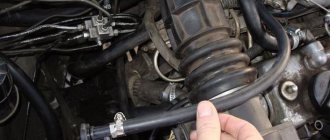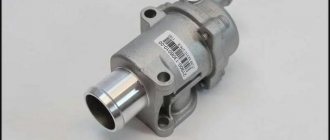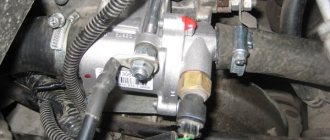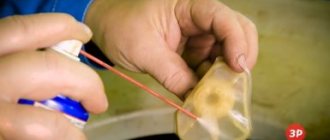Replacing a Kalina thermostat with a Granta thermostat
Car properties: Dimensions of the car are as follows, length - 3595, width - 1100, height - 1693 mm. The wheelbase is 2940 mm. Ground clearance 207 mm. The car is equipped with a hybrid power unit. The 2-cylinder engine is equipped with a system that provides engine power output. There are 4 valves per cylinder. The diameter of the 1st cylinder is 73 mm, the piston stroke is 70 mm. The engine crankshaft accelerates to 7000 rpm. The highest torque is maintained right up to 2000 rpm.
Watch the VIDEO about the Granta thermostat on Kalina 8 valves.
Review from a car enthusiast named Maniy: Reliability, maneuverability, design.
Original title: Termostat prispevok na Kalina 8 ventilov
Laughter on topic: Only on the roads of Russia can you hear: “Oh! A piece of good asphalt!”
LADA Kalina Hatchback Installation of a Granta thermostat and complete replacement of the entire cooling system
In this post, I will try to carefully tell you how to install a Granta thermostat in Kalina and completely replace the entire cooling system. I would like to immediately thank the users and their articles: 1. kombatoleg www.drive2.ru/l/5204906/ — Thermostat from Granta for Kalina2. SV4 www.drive2.ru/c/1759858/ — Granta thermostat in Kalina3. YaTyT11rus www.drive2.ru/l/5471871/ — Replacing the heater radiator without removing the panel I used all their advice and changed a few things. Unfortunately, I didn’t take many photos, because I had to finish it at night by the light of a flashlight. The replacement was caused by a leak in the cooling radiators and the heater radiator. It was decided to replace everything except the pump, because it was replaced a couple of months ago. So, it was purchased: 1. DAAZ cooling radiator
3. Thermostat from Granta with gasket (Kalina is also suitable). 4. Heater pipes. 5. Radiator pipes (upper and lower). 6. Throttle valve heating hose. 7. Radiator pipe from the classic s-shaped
8.Cooling water flange for foreign cars (catalog number 1j0 121 087 b)
9. Expansion tank. 10. Plug of the expansion tank "Avtopribor". 11. M8x10 studs from the classic camshaft. 12. Clamps of various sizes NORMA. 13. Sealant (Kazan). 14. Dzerzhinsky antifreeze 10 l. I’ll immediately say that the radiator pipes and expansion I replaced the tank 2 days after the main work, because the old lower pipe had leaked and found a crack in the tank. At first, I “cooked” a thermostat in a saucepan at home. The opening temperature was about 85 degrees. I decided to raise it. I disassembled the thermostat, took out the thermal insert and shortened the rod by 3 mm. “Cooked” again, the opening temperature became about 90 degrees. Arranged. You can install it. Remove the air filter housing, air duct, battery, and battery platform.
We remove the ignition coil, drain the antifreeze from the block and radiator. We remove all the pipes, the old tremostat, unscrew the old studs and clear the place of the old gasket and sealant.
We remove the cooling fan and the old radiator.
We run to the salon. Remove the accelerator pedal. I disconnected the brake pedal from the VUT and unscrewed the end cap of the brake lamp (this did not have to be done. I had enough strength to push the brake pedal down from the VUT and remove the heater radiator). Next we cut out the part from the body.
I sawed with a metal file and a drill inserted into a screwdriver. We take out the old radiator.
And we put in a new one. We glue the sawn part back with hot glue and fix it through the bar with screws to the whole body.
We install the stove pipes. Installing them was easy, it was VERY difficult and time-consuming to get the clamps on and tighten them. I had to do all this in the dark, because the control rack is in the way, and I don’t have a hole in the garage. But he did. I’ll say right away that I lubricated all the pipes from the inside with sealant. Next, we insert our classic s-shaped radiator pipe into the “saxophone” and try on where we can insert the cooling water flange for foreign cars. We tried it on, cut off the s-shaped pipe and the lower radiator pipe where necessary.
By the way, I forgot to mention that the narrow outlet from the flange is 2 mm smaller than the throttle heating hose. The solution is usual: we heat the outlet with a lighter and press it against the wall, a “mouthpiece” of a suitable size comes out, and the hose is pressed normally with a clamp.
We replace the old thermometer sensor with a sensor from a VAZ 2101 TM106 with an ordinary flat chip, re-soldering the connector (later I realized that it was possible not to change it. There is enough space for the old one). Next, we screw in new studs (on the top stud we had to increase the thread here and there by 1.5 Washing machine) and install a new thermostat . We put the heater supply pipe on it and screw in the fan switch sensor. We are installing a new radiator and then I had a sad moment... When I was tightening the clamp of the steam exhaust hose, its pipe on the radiator broke off... I thought for a long time what to do. Invented! I ground the pipe down to the base of the radiator. Next, we look for a suitable metal fitting, preferably with a thread with a diameter of no more than 6 mm on one side. I found it, I don’t know why, with a diameter of 6 mm. I bought steel epoxy adhesive DD6540
We apply it to the threads and screw it into the radiator, coat it well around it, pull on the steam exhaust hose, tighten the clamp and leave everything to harden (at least 2 hours, but I left it overnight). We put the radiator in place, connect the lower pipe, install the fan, connect the upper pipe, collect everything else, fill in antifreeze, start it, remove the plug, rejoice. Among the changes: 1. Previously, the engine temperature was about 80 degrees, now it remains stable at about 90. 2. The stove is connected not in parallel as in the drain, but in series, therefore in the interior will be warmer in winter. 3. Warming up the engine while driving is noticeably faster. 4. Gasoline consumption has also decreased. Good luck to everyone and smooth roads. I will answer your questions with pleasure.
Please tell me, did the stove fry better after this modification, or did it not change much?
The expansion tank remained in a large circle. therefore, air will only escape when it warms up and the thermostat opens
what's the point anyway? buy a new Kalina and all business without the collective farm.
There is a gasket between the cylinder block and this crap
How many nuts does this entire body hold on, I mean the cylinder block?
A new thermostat from Kalina and not from Granta, just a new model! Any Granta is a restyling of the viburnum! Even now, tarpela from Kalina 2 has been shoved into the new Granta fl; mergetologists no longer know what to come up with to pass off the old as new; changing the name does not change the essence! Kalina remains as it was.
READ Windshield replacement for Skoda Octavia Tour
It would be better not to change it. the collective farm gives off so much that you can feel it through the monitor
Yes, on DO still doesn’t understand why the air in his system doesn’t leave)))
The internal element itself was changed from dozens or all assembled.
The result is so-so, on this particular Kalina, the client says it stays at 80 degrees, and the operating temperature is about 95. We tested it and installed a 10 thermostat, it stays at 95. Install the 10th thermostat guys.
Well, you still have RB in the big circle. Or I don’t understand something. in RB you need to run a hose from the lower pipe of the stove. Then the problem will work
read the mat part and look at the cooling diagram of Granta and Kalina, the difference is visible, everything is clearly shown schematically with arrows, thank you
Signs that you need to replace the thermostat Lada Granta 8 valves
- after the engine has warmed up above 85°C, the large circulation pipes are still cold;
- incomplete opening of the regulator valve, which leads to difficulty in circulating the antifreeze flow;
- the valve does not close the large circuit line at all, which leads to prolonged warm-up of the car engine and excessive fuel consumption;
- depressurization of the line, leakage of antifreeze;
- mechanical damage, deformation of the body;
- the regulator is unstable, the heater does not fully warm up the car interior, which indicates the formation of fossils and rust layers in the line.
Consequences of prolonged engine overheating
Where is the thermostat located on LADA Granta
In the LADA Granta family of cars, the “flow regulator” is fixed on the outer casing of the cylinder block on the rear side. Schematically, it is located on a section of the line between the cylinder block and the radiator of the cooling system.
Replacing the Kalina thermostat with a Granta thermostat
Spare part location
When the temperature reaches 90°C, the regulator redirects the flow of antifreeze from the small circle to the large one. The small circuit structurally consists of:
- water jacket;
- pump (pump);
- stove heater.
Note to the driver! In modifications of the Lada Granta, the heater is looped into a small circuit, and not in parallel, as was the case in previous VAZ models.
When the temperature reaches 90°C, the regulator valve opens and the antifreeze begins to circulate in a large circle, passing through the cooling radiator.
The advantage of a small circle is that the antifreeze, leaving the block, immediately goes to the flow regulator, which allows you to more accurately determine the degree of antifreeze.
At the same time, the thermostat on the Lada Granta opens at 85°C, and not 90°C, as the manufacturer indicates in the instruction manual. The actual range varies from 78°C to 93°C.
Fortunately, underheating does not have critical consequences, but it is not desirable. Such systematic actions lead to deterioration of lubrication, underheating of the combustible mixture, as a result of which the fuel does not burn completely in the cylinders.
Important points when replacing a thermostat
When replacing the thermostat, eliminate the risk of antifreeze getting onto the sensor connectors and into the air path of the LADA Kalina. To prevent such situations, we recommend wrapping electrical connectors and components in plastic bags. Due to the low cost of the thermostat, a more rational action would be to replace the entire thermostat. It is better to purchase original products, since analogues may not match their fastening characteristics (hole diameters, etc.). This will avoid difficult moments during installation.
Reviews
| № | Positive |
| 1. | Vasily: I’ve been actively using the car for a year and a half, there are no complaints, the cooling system works stably. I added antifreeze several times because the level was below average, but this is not so critical. |
| 2. | Gennady: after buying the car, I immediately drained the original antifreeze from the interior and filled it with imported antifreeze. The heater operates at full power, the cabin is always warm, and the engine does not overheat. |
| 3. | Vladlen: at 45,000 km the rubber fluid supply pipe burst, replaced it with a new one. I didn’t contact the service center, I handled it myself. |
| 4. | Kirill: in two years of using the car there were no major breakdowns, and minor ones were fixed on my own without the help of a service station. |
| 5. | Dmitry: at 50,000 km, I replaced all the original clamps on the cooling system pipes, since the old ones had lost their tightness and the liquid began to leak. There are no comments regarding the stove heater. |
| 6. | Denis: mileage 85,000 km, just now replaced the thermostat with a new one. I think that the resource is more than sufficient, as for a domestic car. |
| 7. | Ivan: in three years, I replaced the antifreeze once with a new one, and changed the rubber seal on the body. I am satisfied with the quality of workmanship, there are no particular complaints. |
| Negative | |
| 1. | Victor: low-quality parts, at 45,000 km I replaced the thermostat with a new one, the old one jammed. The antifreeze did not circulate in a large circle due to a malfunction. |
| 2. | Ivan: My regulator lasted for a year and a half, after which the spring jammed. I think that the resource is too small, even for a domestic car. |
| 3. | Vladimir: A year has passed since I bought the car, and I already regret the purchase. Crude assembly, many defects that the manufacturer does not eliminate. |
Adjusting the new thermostat
Resource for replacing the thermostat on Lada Granta 8 valves
There is no clear interval for replacing the regulator; even the manufacturer does not provide such figures. In practice, owners are guided by the principle of reducing the efficiency of the stove heater.
The average service life of a thermostat for Lada Granta is 65 – 75 thousand km. Subject to the manufacturer's recommendations and careful use of equipment, the interval can be increased by 5 - 7 thousand.
Assembling parts - preparing for installation
Thermostat from Granta in viburnum! grantothermostat in viburnum
Here is everything you need to install a Granta thermostat in a viburnum 1- Thermostat 21900-1306010-00 Granta 2- gaskets.
Preparing to install the thermostat
First you need to remove the standard Kalina thermostat. Before this, the battery, air filter and pipe leading to the gas throttle are removed. Having finished with the air filter, begin to drain the antifreeze from the cooling system. It is better to place a basin under the engine, so the coolant will not spill.
After loosening the clamps, remove all pipes from the thermostat. Then they begin to unscrew the nuts on the studs. Unscrew the nuts and remove the thermostat. This completes the procedure for dismantling the old device. Preparations begin for installing the thermostat from the Granta car. To do this, you need to unscrew the old studs. This is easy to do with a hairpin driver, but if you don’t have such a wrench, you just need to screw a nut onto the hairpin, and then another one. Pull them tightly and unscrew them using a regular wrench. After removing the old studs, clean the thermostat installation site from old sealant and gasket residues. This is where the preparation ends.
READ Where is the DMRV sensor located on VAZ 2110
Engine cooling system
The internal combustion engine must be intensively cooled. Without this, the unit will overheat and jam. The bulk of the “cooling energy” is required by the cylinder head and block. While small power engines can be cooled using an air flow, more powerful, multi-cylinder power plants cannot be brought to an optimal temperature without using a liquid cooling system.
- a cooling jacket through which liquid flows, taking away excessive heat from the cylinders;
- a pump that forces antifreeze to move through the cooling system;
- a thermostat that regulates the temperature by adjusting the flow of coolant in a small or large circle;
- fan and radiator, causing the liquid to cool faster as it moves around a large cooling circle;
- heater radiator that heats the interior of the car;
- connecting hoses and pipes connecting all devices into a single cooling system.
As mentioned above, the thermostat is responsible for movement in a large or small circle. This device is a spring-loaded valve with a thermocouple placed in a housing with several pipes. Under the influence of high temperature, from 85 ° C to 90 ° C, the technical paraffin contained in the thermoelement expands and opens the valve. Antifreeze begins to flow through the opened hole in a large circle, cooling in the radiator. When the liquid cools, the valve falls into place and the coolant stops flowing into the large circle.
And the story will be about replacing the thermostat of a LADA Kalina car with a thermostat from a Lada Granta.
Briefly about these machines. Both models represent a small class of domestic passenger cars. Kalina was produced from 2004 to 2022, and then it was replaced by Granta. The article will discuss replacing the thermostat that is installed in Kalina with an 8-valve engine with a Lada Granta thermostat .
general information
There are single-valve, two-stage and two-valve thermostats, as well as electronically controlled devices. Grants are equipped with thermostats Luzar LT0191 and Luzar LT0190 (costing from 450 rubles for the first, and from 800 rubles for the second), FENOX TS034E7 (costing from 800 rubles), VAZ-2123 (article 2123-1306010, cost from 650 rub.). It is worth mentioning such devices as VAZ-2101 GATES (article TH14580, cost - from 350 rubles), VAZ-2121 GATES (article TH15380, approximate cost - from 500 rubles), VAZ-2110 (article 21082-1306010, cost - from 600 rub.) and other devices. They are located between the engine and the radiator, but it should be noted that there are differences in the location of the thermostats on Grants with eight-valve and sixteen-valve engines.
Their main task is to prevent the movement of antifreeze through the radiator until the car engine warms up to the required temperatures. Accordingly, if the car engine does not warm up, then the coolant does not move in a large circle. Usually the thermostat is activated when the engine reaches a temperature of 80-95C. Among other things, the thermostat helps reduce the amount of harmful emissions released into the atmosphere and minimize engine wear.
The thermoelement located inside the device is made of brass, has a cylindrical shape and is filled with artificial wax. When the engine reaches a temperature of approximately 82C, this substance begins to melt, which causes it to expand. This sets the valve in motion, it opens, after which the antifreeze begins to circulate through the car’s radiator. Turning off the motor causes the wax to solidify inside the thermostat and close the damper.
Below we will talk in more detail about possible malfunctions of thermostats, provide instructions for replacing and checking them, and also share a technique for reworking and upgrading this part, allowing you to increase its response threshold to 92C.
Why change the Kalina thermostat to a Grantovsky device?
There can be only two reasons why they change the original thermostat installed on “Kalina” to a device with “Granta”:
- Firstly, it is engine overheating when the power plant temperature needle is about 100 °C. This mode of operation can lead to jamming of the pistons.
- Secondly, there is insufficient heating of the interior in winter. In addition to the fact that it is uncomfortable to be in a cold car interior, this also causes the windows to freeze and you have to drive blindly. And this is a real danger to life.
This is due to the fact that the standard cooling system of the LADA Kalina does not know how to “de-air” itself. That is, if air gets into the small cooling circle, it will no longer be removed from the system. The process grows like an avalanche, air will continue to be sucked in constantly. This leads to the fact that the coolant does not flow to the radiator, the engine overheats, and cold air blows from the stove. The problem is solved by installing a thermostat from LADA Granta . As the owners of Kalina , who decided to take such a step, say, after reinstalling the thermostat, all problems were solved: the cabin became warm, and the engine temperature did not rise above 90 ° C.
Signs of breakdown
The thermostat is a fairly simple element, however, and it is not immune to breakdowns. Normally, after starting a cold engine, the lower hose extending from the radiator does not heat up for some time, but after the coolant temperature exceeds 85C (±2C), it begins to quickly heat up (provided the thermostat is in full working order). It is this aspect that will accurately indicate to the car owner the moment the coolant begins to circulate.
In cases where the valve cannot open, the coolant stops circulating and the engine begins to overheat. Overheating also causes incomplete opening of the valve. A delay in closing the valve, on the contrary, creates conditions for a longer warm-up of the engine, especially in the cold season.
As a rule, thermostat failure is caused by the following reasons:
- an unstable engine (triplication often leads to valve damage);
- wear of the rubber gasket;
- corrosion (it is the most common cause of breakdowns);
- antifreeze gets inside the thermostat;
- there is a leakage of wax from the device;
- there is mechanical damage on the valve.
Most often, a malfunction of the thermostat leads to the impossibility of further movement in the car, and therefore the faulty part must be replaced immediately.
Installation of a thermostat from Granta
Before installing a new temperature-maintaining device, the studs from the camshaft of “classic” VAZ models are screwed in. All heels have triangular cutouts at one end. This is how manufacturers mark the end that screws into the engine block. Sealant is applied to the junction of the thermostat and the engine and a gasket is installed. The following installation steps:
- The thermostat is mounted on studs and screwed with nuts.
- A pipe is removed from the lower outlet of the stove in order to insert a tee into it, another outlet of which will be connected by a pipe to the expansion tank.
- After completing this procedure, the pipe is put in place, connecting the thermostat and the stove. A pipe leading to the expansion tank is put on the outlet of the tee and secured with a clamp. Air will be removed from the cooling system through it.
- A Grant hose is installed, running from the lower radiator pipe to the thermostat. It fits almost perfectly, so there is no need to lengthen or shorten anything.
- All that remains is to secure all the pipes with clamps, install the air filter, battery and add antifreeze.
If everything is done correctly, the engine will stop heating and will not raise the temperature needle close to critical values. And the car interior will be warm, even in the coldest weather.
Verification methods
There are two ways to determine the functionality of the thermostat. The first method involves checking without dismantling. To do this, you need to start a cold engine, warm it up to operating temperature (about 90 degrees), and touch the lower radiator hose.
A cold lower pipe at this temperature indicates that for some reason the thermostat did not open. If it is hot, the thermostat operates normally.
For a more accurate check, you will need to remove the thermostat cover with the sensitive element. Place it in a metal container with clean cold water and place it on the stove to warm up. When the water temperature reaches 85-90 degrees, the element should operate, pushing the valve stem forward. If this does not happen, the thermostat is faulty.
How can you modify the heater?
The new models LADA Kalina 2 and LADA Granta use a cooling system operating scheme with parallel connection of the heater radiator. Because of this, the operating temperature is reduced to 85 degrees, which is slightly lower than on previous models of the VAZ family. Many car owners seriously believe that this temperature cannot be normal - there is increased fuel consumption, as well as a decrease in the service life of moving engine parts due to premature wear. But according to experts, there is no connection between the reduced operating temperature and engine life.
The cooling system of the Lada Kalina works more efficiently thanks to a single-circuit design. Such a modernization only benefited the engine; it made it possible to change the ignition timing, resulting in fuel savings. The inertia of the thermostat is also reduced. The downside was the mediocre heating of the cabin at sub-zero temperatures. The way out of the situation is to independently modify the thermostat. Modification involves two main methods:
- shorten the rod of the solid-state temperature-sensitive element;
- replace the thermocouple.
For cars with a cable gas pedal, a heated throttle assembly from the cooling system is used. In this case, an additional circulation circle is added.
Throttle valve heating
Another modification of the “thermos” on the VAZ-2190 is the installation of a heating circuit for the throttle assembly. This is how some car enthusiasts insure themselves against freezing of the throttle valve. To do this, an additional threaded hole is made in the cover of the part, where a fitting is welded through a copper washer to drain the heated liquid. The studs for attaching the “thermos” will also have to be enlarged.
In the end, I would like to note that the engine temperature also depends on the brand of antifreeze used and the viscosity-temperature properties of the oil. Low temperatures in the cabin may be caused by problems in various vehicle systems.
In the engine cooling system in a Lada Kalina car with an engine of 8 valves, as well as 16 valves, the thermostat plays a significant role, because it is a regulating link, thanks to which the operating temperature necessary for the normal implementation of the combustion process is maintained in the circuit. The main signs of failure of this part are:
- unit overheating;
- inability of the motor to reach its operating temperature.
Let's look at how to replace such an important component as a thermostat using the example of a Lada Kalina 8-valve engine; similar work is performed on a 16-valve engine. Doing this work yourself will allow you to gain enviable experience and save a lot of money.
Features of replacing a thermostat on Kalina
How to replace a thermostat? To successfully implement the indicated procedure, the owner will need to adhere to the steps below.
- First, disconnect the connector of the sensor connected to the intake air tract filter element unit.
- To ensure better convenience, we recommend that you completely remove the air filter housing from the engine compartment. It is held in place by three fastening points, 2 of which are based on elastic bands, and the third is located in the battery area.
- Before draining the antifreeze from the cooling circuit, we determine how to carry out this manipulation. Here we highlight two of the most convenient methods.
- The first method is a procedure that allows you to perform a drain using a conventional air compressor used to inflate tires. This option eliminates the need for a pit or lift, and the work itself can be done in any suitable location. Now you know how to change it, but let’s add that the undeniable advantage of this method is that there is no need to remove the pipes and unscrew the plugs located on the engine block and radiator.
- Before the procedure, we stock up on an empty container, the capacity of which is equivalent to 4-6 liters of liquid, as well as directly on the compressor with the device.
- Open the cap on the expansion tank, from which we also remove a small diameter hose. We seal the “bare” tank fitting with adhesive tape.
- We place this hose in a pre-prepared container and hold it securely inside the container.
- The hose leading from the discharge pipe of the compressor unit is inserted into the hole in the expansion tank (sealed).
- By briefly turning on the compressor, we force compressed air to penetrate into the system. Air displaces liquid from the circuit, and it flows into the container.
- We carry out the procedure until the antifreeze is completely removed from the LADA Kalina system.
- The second common method is to drain through open plugs on the radiator and engine block.
- For this purpose, we also prepare a suitable container and, using the indicated manipulations, completely drain the liquid. Don't forget to screw the plugs back in.
- Now, using a convenient screwdriver, we loosen the fasteners of all pipes suitable for the thermostat and then remove them.
- To dismantle the thermostat itself, we arm ourselves with a hex key, size “5”, and unscrew the 3 screws.
- If, after unscrewing, the unit does not “want” to be disconnected from the lines, then using the same screwdriver, we loosen it, running the tip between the adjacent surfaces.
- We clean the mating sections of the main pipes with the LADA Kalina thermostat from scale formations and at the same time replace the sealing gaskets.
- We install the new product in its original place, tightening the bolts securely.
- After this, we connect all the dismantled pipes to their original places, not forgetting to tighten the fastening clamps.
- We check the reliability of the screwed plugs and fill the system with antifreeze. We do this through the neck in the expansion tank of LADA Kalina.
- In some cases, it will be convenient to replace the thermostat along the way if its service life suggests this action or is approaching such a need.
- Upon completion of filling, install the housing with the air filter and connect the previously disconnected sensor. Now you know how to change the thermostat in your car, so replacing the thermostat will not be too difficult for you.
READ Installing gas equipment on a diesel engine
Replacement instructions
The replacement process is not complicated and can be done independently if you follow the instructions. First you need to disconnect the wire plug from the sensor on the air filter and remove it. It will take a few minutes to properly dismantle the filter:
- the two upper screws are completely unscrewed together with the nut from the power unit side;
- there is a recirculation valve on the filter housing; it must also be removed;
- lift the valve up and, without disconnecting the hoses, move it to the side;
- unplug the terminal from the air sensor and, loosening the clamps, disconnect the air pipe;
- After shaking the filter from side to side, turn its housing and try to pull it out.
- Drain the coolant from the system.
- Using an 8 mm wrench or a shaped screwdriver, loosen all the clamps of all connecting hoses, then disconnect them.
- Unscrew the 12 mm nut on the thermostat and remove the wire.
- Using a 13 mm wrench, unscrew the fastening nut at the top and bottom of the thermostat on the studs, then try to remove the device by slightly loosening it. You don't need to make a lot of effort for this. Keep in mind that the thermostat operates at high temperatures, due to which the housing literally “sticks” to the seat.
- Clean the seat from dirt and remove the old sealing gasket. Then wipe the treated area with a clean rag, apply a thin layer of silicone cover and leave for 5-10 minutes.
- The new thermostat is installed in the reverse order. You should definitely replace the temperature sensor by removing it from the old device, and do not forget to connect the ground wire. To do this, it is fixed with a nut on the upper stud.
- Connect all hoses and fill the system with coolant to the maximum level.
After completing these steps, you need to start the engine and inspect all the places that were disconnected. You can make sure there are no leaks by lightly pressing all the hoses several times. The liquid level in the tank will drop, then you need to add antifreeze to the middle mark and screw the cap tightly.
Throttle body heating
Another way to upgrade the heater is to create an additional throttle valve heating circuit. Some drivers are trying to prevent the unit from freezing in winter in this way. The method is clearly not for beginners. It consists of drilling a hole in the cover of the device and welding an additional fitting to it, through which heated antifreeze will be discharged. The thermostat mounting studs will also have to be lengthened. The process is labor-intensive and ultimately impractical. Freezing of the throttle assembly is the exception rather than the rule, so there is no point in carrying out such an upgrade.
LADA Kalina thermostat installation from Granta
Experienced car enthusiasts understand the principle of operation of the thermostat. Beginners have only heard about this part, but do not know what it is used for. Everyone encounters a thermostat sooner or later, since the unit changes with the same frequency as any other consumable. It lasts no more than three years, and its breakdown is difficult not to notice.
Adjusting the thermocouple rod
Shortening the end of the thermosensitive element rod will allow you to adjust the operating temperature to 90-95 degrees. Trimming is carried out sequentially in increments of no more than one millimeter. The metal is soft, so the procedure must be carried out carefully. the thermostat after each millimeter cut and check how much the operating temperature rises while driving.
Converting Kalina's SOD to a Granta thermostat
If the result does not meet expectations, you can adjust the rod further until the arrow on the instrument panel shows 95 degrees and the air in the cabin begins to warm up faster. The method is simple but effective. Among the disadvantages, there is a slight increase in wear of SOD parts due to operation at high temperatures. If you overdo it with shortening, you can ruin the device.
Adjusting the stroke of the thermoelement
Trimming the heel of the thermoelement rod allows you to increase the temperature of the coolant to 85-90° C. We shorten the rod sequentially, 1 mm at a time. This should be done carefully, as its metal is quite soft. Each time after trimming, you need to install a thermostat in the car and monitor the temperature of the fluid while driving. If it does not satisfy you, the rod is shortened by another 1 mm. And so on until the temperature in the cooling system reaches 90-92° C, and the air in the cabin warms up to the required temperatures.
Characteristics of the Lada Kalina thermostat
The thermostat is an important engine cooling system; it occupies a place between the radiator and the cylinder block of the power unit. By design, this is a housing with an automatic valve, which, when the coolant is heated to a certain temperature, opens a large circulation circuit through the main cooling radiator. By closing the large circuit when the engine is cool, the car warms up much faster when circulating through the small circuit. The wear of its moving parts is reduced, overheating is eliminated, and the volume of harmful substances released into the environment is reduced.
A working thermostat allows you to warm up the engine to operating temperature, which for Kalina is 90-95 degrees. Over time, the valve wears out, and the heater maintains a temperature of no higher than 80 degrees. A working device helps the engine quickly warm up even in severe frost. Thanks to this device, the stove on Kalina is considered one of the warmest on VAZ cars. According to experts and car enthusiasts, the best price-quality ratio is the standard thermostat produced by DAAZ. It's all about a special screw, with which you can independently adjust the valve opening temperature. It is impossible not to take into account the reliability of factory products, which in this regard are superior to most analogues.
Thermostat from grants for viburnum
The same thermostats are used for 8- and 16-valve engines.
Sources:
https://avtotehpomosch-kruglosutochno.ru/diagnostika-i-remont/kak-postavit-termostat-ot-granty-na-kalinu.html https://osensorax.ru/klimat/termostat-granta-na-kalinu https: //automotocity.com/avtovaz/lada-kalina-ustanovka-termostata-ot-granty.html
How the device works
Photo 2 (Heater valve operation diagram)
Heater valve operation diagram
When the engine is cold, the thermostat valve is in the closed position, and antifreeze circulates in a small circle, passing only through the heater core and through the water jacket of the block. When the engine warms up to operating temperature, the valve opens completely and the liquid begins to circulate in a large circle, passing through the radiator, where it cools. This prevents overheating of the power unit.
In winter, warming up takes less time thanks to the thermostat - the heater radiator heats up earlier, and the cabin becomes warm within a few minutes, while saving fuel. The thermostat must be replaced if, when the temperature reaches 95 degrees or more, the valve does not open - the engine begins to overheat. If the motor, on the contrary, cannot warm up, it means that the device does not close and must also be replaced.
In design, this is a simple product consisting of a body, a main and bypass valve, a temperature-sensitive element, two inlet and one outlet pipe. Depending on the manufacturer, the thermostat is made of copper, brass or heat-resistant plastic. The heat-sensitive solid element is based on technical wax. When heated, it melts and, expanding, presses on the main valve, forcing it to open, thereby passing coolant in a large circle. The wax melts quickly thanks to the copper, aluminum and graphite powder that is included in its composition.
You can check the performance of the heater without installing it in the cooling system. To do this, place the device in a container of water and place it on the stove. As the liquid heats up, the thermostat valve opens approximately 3 centimeters. This way you can make sure that the device is working properly before installing it.











